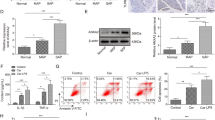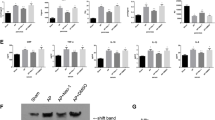Abstract
Background
Activation of the transcription factor NF-κB and expression of pro-inflammatory mediators have been considered as major events of acute pancreatitis (AP). Karyopherin alpha 2 (KPNA2), a member of the importin α family, reportedly modulates p65 subcellular localization.
Aim
This study aimed to investigate the expression and possible functions of KPNA2 in the AP cell and animal model, focusing on its association with NF-κB activation.
Methods
An AP cell model was established with the cerulein-stimulated AR42J and isolated rat pancreatic acinar cells. The AP rat model was induced by the intraperitoneal injection of cerulein. The secretion of TNF-α, IL-6, and LDH was detected by ELISA kits and the production of NO using nitric oxide kit. Expression of KPNA2 was measured by RT-PCR and Western blot. Expression levels of IKKα, phosphorylation of p65, and total p65 were detected by Western blot. Co-localization of KPNA2 with p65 was observed by immunofluorescence assay. To determine the biological functions of KPNA2 in cerulein-induced inflammatory response, RNA interference was employed to knockdown KPNA2 expression in AR42J and isolated pancreatic acini cells.
Results
Cerulein stimulated KPNA2 expression and IL-6, TNF-α, NO, and LDH production in rat pancreatic acinar cells. Cerulein triggered the phosphorylation and nuclear translocation of NF-κB p65 subunit, indicating the NF-κB activation. The co-localization and nuclear accumulation of KPNA2 and p65 were detected in cerulein-treated cells. Knocking down KPNA2 hindered cerulein-induced nuclear transportation of p65 and alleviated the subsequent inflammatory response in rat pancreatic acinar cells. Additionally, KPNA2 expression was significantly up-regulated in cerulein-induced AP rat model.
Conclusions
KPNA2-facilitated p65 nuclear translocation promotes NF-κB activation and inflammation in acute pancreatitis.






Similar content being viewed by others
References
Steer M. Pancreatitis severity: who calls the shots? Gastroenterology. 2002;122:1168–1172.
Sonda S, Silva AB, Grabliauskaite K, et al. Serotonin regulates amylase secretion and acinar cell damage during murine pancreatitis. Gut. 2013;62:890–898.
Wan H, Yuan Y, Liu J, Chen G. Pioglitazone, a PPAR-gamma activator, attenuates the severity of cerulein-induced acute pancreatitis by modulating early growth response-1 transcription factor. Transl Res J Lab Clin Med. 2012;160:153–161.
Rakonczay Z Jr, Hegyi P, Takacs T, McCarroll J, Saluja AK. The role of NF-kappaB activation in the pathogenesis of acute pancreatitis. Gut. 2008;57:259–267.
Sorokin AV, Kim ER, Ovchinnikov LP. Nucleocytoplasmic transport of proteins. Biochem Biokhimiia. 2007;72:1439–1457.
Harel A, Forbes DJ. Importin beta: conducting a much larger cellular symphony. Mol Cell. 2004;16:319–330.
Tejomurtula J, Lee KB, Tripurani SK, Smith GW, Yao J. Role of importin alpha8, a new member of the importin alpha family of nuclear transport proteins, in early embryonic development in cattle. Biol Reprod. 2009;81:333–342.
Gorlich D, Kutay U. Transport between the cell nucleus and the cytoplasm. Annu Rev Cell Dev Biol. 1999;15:607–660.
Kohler M, Ansieau S, Prehn S, Leutz A, Haller H, Hartmann E. Cloning of two novel human importin-alpha subunits and analysis of the expression pattern of the importin-alpha protein family. FEBS Lett. 1997;417:104–108.
Lange A, Mills RE, Lange CJ, Stewart M, Devine SE, Corbett AH. Classical nuclear localization signals: definition, function, and interaction with importin alpha. J Biol Chem. 2007;282:5101–5105.
Sudhakar JN, Chow KC. Human RAD23 homolog A is required for the nuclear translocation of apoptosis-inducing factor during induction of cell death. Biol Cell Under Auspices Euro Cell Biol Org. 2014;106:359–376.
Liang P, Zhang H, Wang G, et al. KPNB1, XPO7 and IPO8 mediate the translocation of NF-kappaB/p65 into the nucleus. Traffic. 2013;14:1132–1143.
Kaufmann A, Rossler OG, Thiel G. Expression of the transcription factor Egr-1 in pancreatic acinar cells following stimulation of cholecystokinin or Galphaq-coupled designer receptors. Cell Physiol Biochem Int J Exp Cell Physiol Biochem Pharmacol. 2014;33:1411–1425.
Liu Y, Yang L, Chen KL, et al. Knockdown of GRP78 promotes apoptosis in pancreatic acinar cells and attenuates the severity of cerulein and LPS induced pancreatic inflammation. PLoS ONE. 2014;9:e92389.
Szmola R, Sahin-Toth M. Pancreatitis-associated chymotrypsinogen C (CTRC) mutant elicits endoplasmic reticulum stress in pancreatic acinar cells. Gut. 2010;59:365–372.
Hu G, Shen J, Cheng L, et al. Reg4 protects against acinar cell necrosis in experimental pancreatitis. Gut. 2011;60:820–828.
Yuan J, Liu Y, Tan T, et al. Protein kinase D regulates cell death pathways in experimental pancreatitis. Front Physiol. 2012;3:60.
Xu M, Wang KN, Wu K, Wang XP. Pyrrolidine dithiocarbamate inhibits nuclear factor kappaB and toll-like receptor 4 expression in rats with acute necrotizing pancreatitis. Gut Liver. 2014;9:411–416.
Sah RP, Garg SK, Dixit AK, Dudeja V, Dawra RK, Saluja AK. Endoplasmic reticulum stress is chronically activated in chronic pancreatitis. J Biol Chem. 2014;289:27551–27561.
Mashima H, Ohnishi H. [The mechanism of the onset of acute pancreatitis] Nihon Shokakibyo Gakkai zasshi = Jpn J. Gastro-Enterol. 2014;111:1550–1560.
Hoque R, Farooq A, Ghani A, Gorelick F, Mehal WZ. Lactate reduces liver and pancreatic injury in Toll-like receptor- and inflammasome-mediated inflammation via GPR81-mediated suppression of innate immunity. Gastroenterology. 2014;146:1763–1774.
Kaufmann K, Thiel G. Epidermal growth factor and thrombin induced proliferation of immortalized human keratinocytes is coupled to the synthesis of Egr-1, a zinc finger transcriptional regulator. J Cell Biochem. 2002;85:381–391.
Bettaieb A, Chahed S, Tabet G, et al. Effects of soluble epoxide hydrolase deficiency on acute pancreatitis in mice. PLoS ONE. 2014;9:e113019.
Baumann B, Wagner M, Aleksic T, et al. Constitutive IKK2 activation in acinar cells is sufficient to induce pancreatitis in vivo. J Clin Investig. 2007;117:1502–1513.
Sendler M, Dummer A, Weiss FU, et al. Tumour necrosis factor alpha secretion induces protease activation and acinar cell necrosis in acute experimental pancreatitis in mice. Gut. 2013;62:430–439.
Saluja AK, Lerch MM, Phillips PA, Dudeja V. Why does pancreatic overstimulation cause pancreatitis? Annu Rev Physiol. 2007;69:249–269.
Molina-Navarro MM, Trivino JC, Martinez-Dolz L, et al. Functional networks of nucleocytoplasmic transport-related genes differentiate ischemic and dilated cardiomyopathies. A new therapeutic opportunity. PLoS ONE. 2014;9:e104709.
Hu ZY, Yuan SX, Yang Y, Zhou WP, Jiang H. Pleomorphic adenoma gene 1 mediates the role of karyopherin alpha 2 and has prognostic significance in hepatocellular carcinoma. J Exp Clin Cancer Res CR. 2014;33:61.
Schaller T, Pollpeter D, Apolonia L, Goujon C, Malim MH. Nuclear import of SAMHD1 is mediated by a classical karyopherin alpha/beta1 dependent pathway and confers sensitivity to VpxMAC induced ubiquitination and proteasomal degradation. Retrovirology. 2014;11:29.
Algul H, Treiber M, Lesina M, et al. Pancreas-specific RelA/p65 truncation increases susceptibility of acini to inflammation-associated cell death following cerulein pancreatitis. J Clin Investig. 2007;117:1490–1501.
Karin M, Lin A. NF-kappaB at the crossroads of life and death. Nat Immunol. 2002;3:221–227.
Bae GS, Heo KH, Park KC, et al. Apamin attenuated cerulein-induced acute pancreatitis by inhibition of JNK pathway in mice. Dig Dis Sci. 2013;58:2908–2917.
Huang H, Liu Y, Daniluk J, et al. Activation of nuclear factor-kappaB in acinar cells increases the severity of pancreatitis in mice. Gastroenterology. 2013;144:202–210.
Ahn DW, Ryu JK, Kim J, et al. Inflexinol reduces severity of acute pancreatitis by inhibiting nuclear factor-kappaB activation in cerulein-induced pancreatitis. Pancreas. 2013;42:279–284.
Acknowledgments
This work was supported by National Basic Research Program of China (973 Program, No. 2012CB822104); National Natural Science Foundation of China (31170766, 81470806, 31500647); the Natural Science Foundation of the Jiangsu Higher Education Institutions of China (15KJA310003); the Natural Science Foundation of Jiangsu Province (BK20150408); A Project Funded by the Priority Academic Program Development of Jiangsu Higher Education Institutions (PAPD); Development Fund for Collaborative Innovation Center of Glycoscience of Shandong University.
Author information
Authors and Affiliations
Corresponding authors
Ethics declarations
Conflict of interest
The authors have declared that there is no conflict of interest.
Additional information
Yongxia Cai and Yanbo Shen contribute equally to this work.
Rights and permissions
About this article
Cite this article
Cai, Y., Shen, Y., Gao, L. et al. Karyopherin Alpha 2 Promotes the Inflammatory Response in Rat Pancreatic Acinar Cells Via Facilitating NF-κB Activation. Dig Dis Sci 61, 747–757 (2016). https://doi.org/10.1007/s10620-015-3948-6
Received:
Accepted:
Published:
Issue Date:
DOI: https://doi.org/10.1007/s10620-015-3948-6




